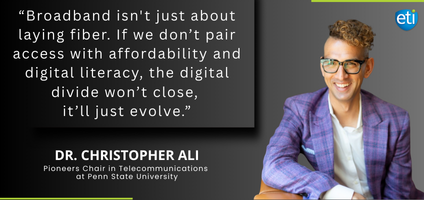
The following summary has been condensed for length and readability. To listen to the full discussion, click here. This episode is sponsored by ETI Software and VETRO FiberMap.
In this episode of the Broadband Bunch, host Brad Hine speaks with Dr. Christopher Ali, Pioneers Chair in Telecommunications and Associate Professor at Penn State’s Bellisario College of Communications. Recorded at the CBAN Spring Summit, the episode dives into the real-world challenges and policy shifts shaping broadband access across the U.S.—with a particular focus on what comes after BEAD.
As states mobilize their BEAD (Broadband Equity, Access, and Deployment) plans, Dr. Ali urges policymakers and providers to temper headline-driven ambitions like “universal coverage by 2026” with realism. He argues that while BEAD represents a critical step forward, it’s not a silver bullet—and warns that without smart implementation, we risk falling into the same traps that have plagued past funding programs.
He emphasizes the need for long-term strategy over short-term metrics. “Broadband isn’t just about access—it’s about permanence, affordability, and adaptability,” he says.
One of the most overlooked pieces of the broadband puzzle, according to Dr. Ali, is middle-mile infrastructure. Often invisible to the end user, these backhaul connections are essential for connecting rural communities to the broader internet backbone. He notes that electric cooperatives—already laying fiber for internal use—are uniquely positioned to help bridge this gap, and their role must be elevated in future funding and policy efforts.
Rather than pitting fiber and fixed wireless against each other, Dr. Ali makes a compelling case for synergy. Fiber is the long-term foundation, he explains, but wireless technologies—especially when deployed in smart ways—can quickly extend connectivity to hard-to-reach areas. From first responders to precision agriculture, fixed wireless plays a complementary role that shouldn’t be dismissed in the rush to fiberize everything.
Access alone isn’t enough. Ali warns of the growing gap between availability and usability, pointing to ongoing challenges around affordability and digital literacy. He critiques the temporary nature of many broadband assistance programs, calling out “sunset clauses” that threaten to strand vulnerable users once funding dries up.
He also underscores the role of digital literacy as a critical enabler of adoption—especially in rural and underserved communities. Simply dropping fiber in the ground doesn’t close the digital divide; education and support must follow.
Looking ahead, Dr. Ali shares details of his upcoming initiative, “Broadband Stories,” a project that aims to elevate real human experiences around broadband access—or the lack thereof. By focusing on personal narratives, the project seeks to shift broadband policy from an abstract technical issue to a tangible human right.
“It’s one thing to show a coverage map,” he says. “It’s another to hear from a farmer who can’t upload his crop reports, or a student who has to do homework in a McDonald’s parking lot.”
Throughout the episode, Dr. Ali reiterates that broadband must be treated as essential infrastructure—like water or electricity—not as a luxury. He encourages all stakeholders to move beyond compliance and think deeply about what success really looks like in broadband deployment.
“Connectivity isn’t just a checkbox,” he reminds us. “It’s the foundation for participation in modern life.”
© 2025 Enhanced Telecommunications.